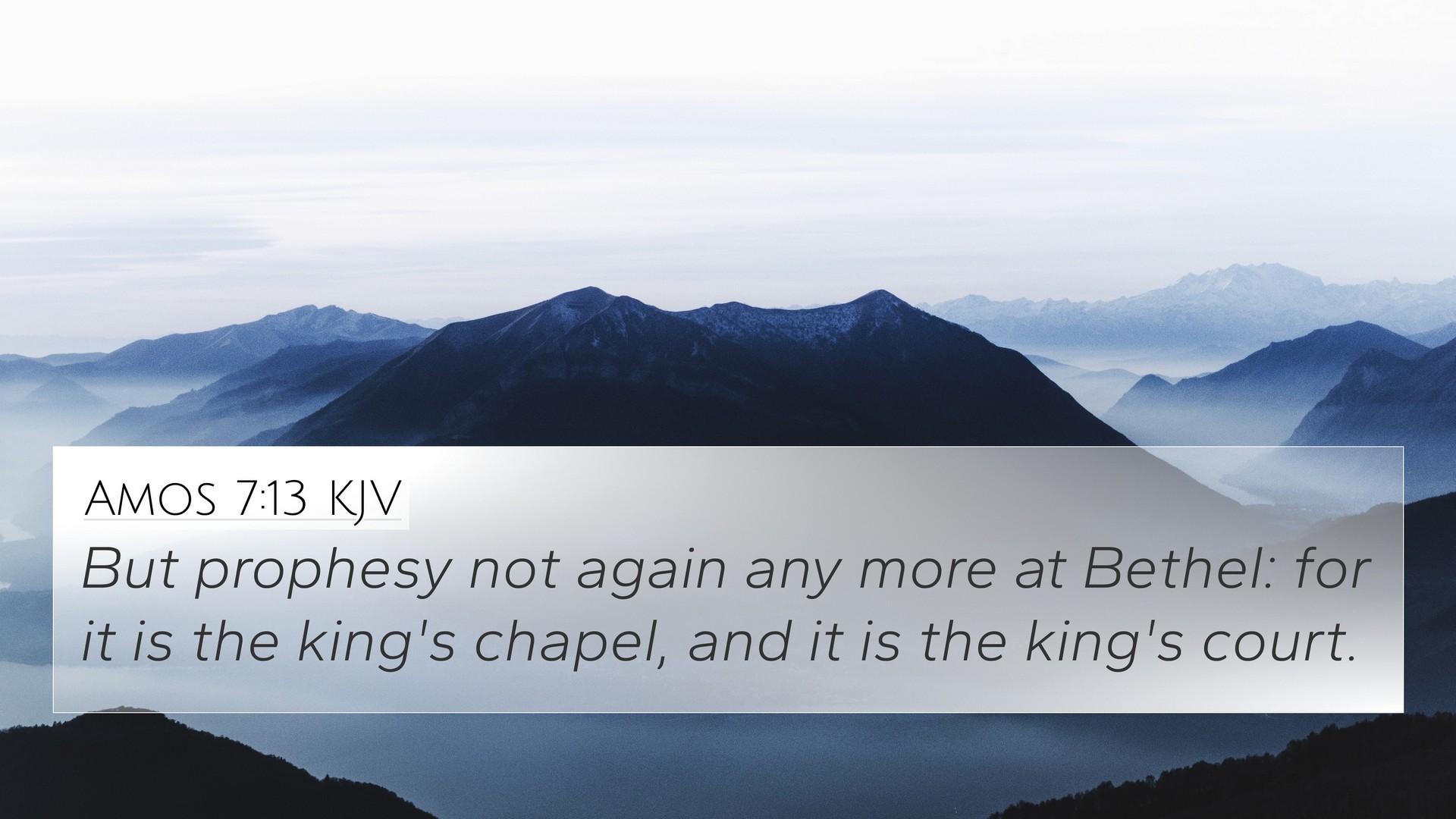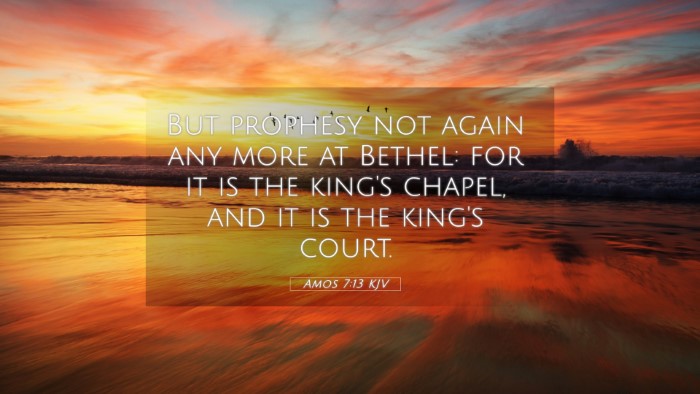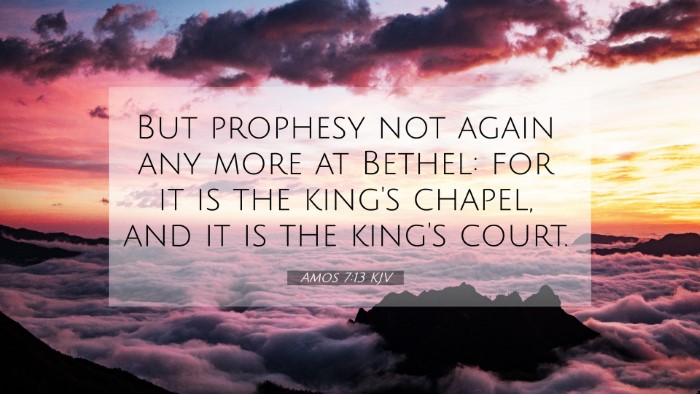Old Testament
Genesis Exodus Leviticus Numbers Deuteronomy Joshua Judges Ruth 1 Samuel 2 Samuel 1 Kings 2 Kings 1 Chronicles 2 Chronicles Ezra Nehemiah Esther Job Psalms Proverbs Ecclesiastes Song of Solomon Isaiah Jeremiah Lamentations Ezekiel Daniel Hosea Joel Amos Obadiah Jonah Micah Nahum Habakkuk Zephaniah Haggai Zechariah MalachiAmos 7:13 Similar Verses
Amos 7:13 Cross References
But prophesy not again any more at Bethel: for it is the king's chapel, and it is the king's court.
Uncover the Rich Themes and Topics of This Bible Verse
Listed below are the Bible themes associated with Amos 7:13. We invite you to explore each theme to gain deeper insights into the Scriptures.
Amos 7:13 Cross Reference Verses
This section features a detailed cross-reference designed to enrich your understanding of the Scriptures. Below, you will find carefully selected verses that echo the themes and teachings related to Amos 7:13 KJV. Click on any image to explore detailed analyses of related Bible verses and uncover deeper theological insights.
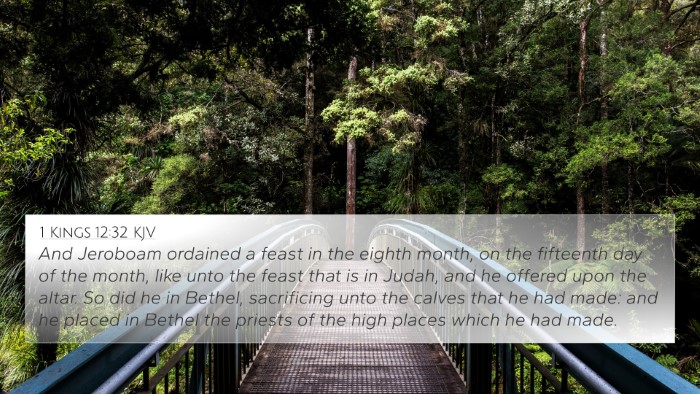
1 Kings 12:32 (KJV) »
And Jeroboam ordained a feast in the eighth month, on the fifteenth day of the month, like unto the feast that is in Judah, and he offered upon the altar. So did he in Bethel, sacrificing unto the calves that he had made: and he placed in Bethel the priests of the high places which he had made.
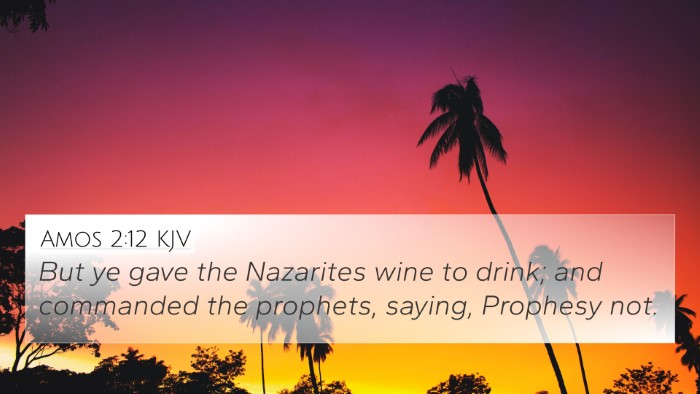
Amos 2:12 (KJV) »
But ye gave the Nazarites wine to drink; and commanded the prophets, saying, Prophesy not.
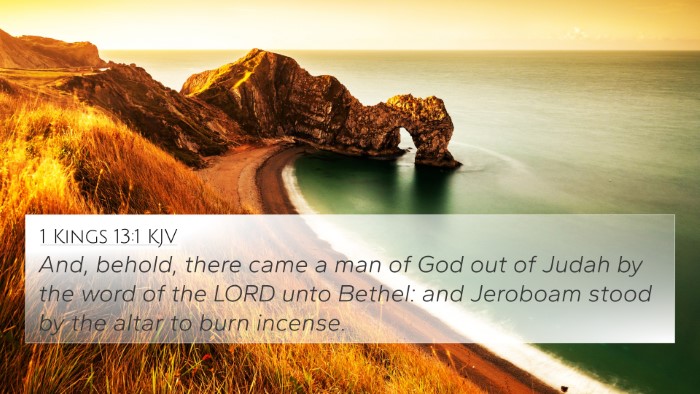
1 Kings 13:1 (KJV) »
And, behold, there came a man of God out of Judah by the word of the LORD unto Bethel: and Jeroboam stood by the altar to burn incense.

Acts 5:40 (KJV) »
And to him they agreed: and when they had called the apostles, and beaten them, they commanded that they should not speak in the name of Jesus, and let them go.
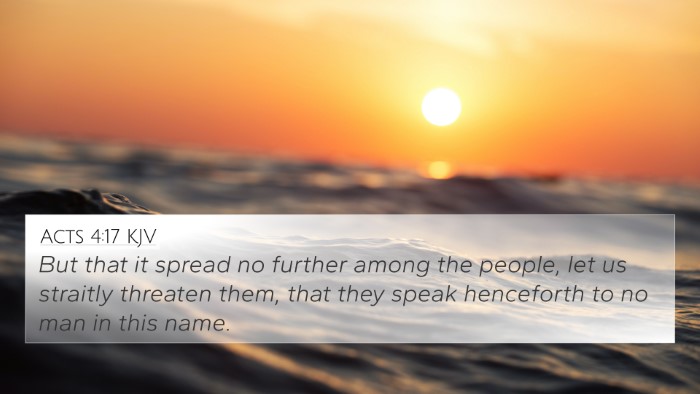
Acts 4:17 (KJV) »
But that it spread no further among the people, let us straitly threaten them, that they speak henceforth to no man in this name.
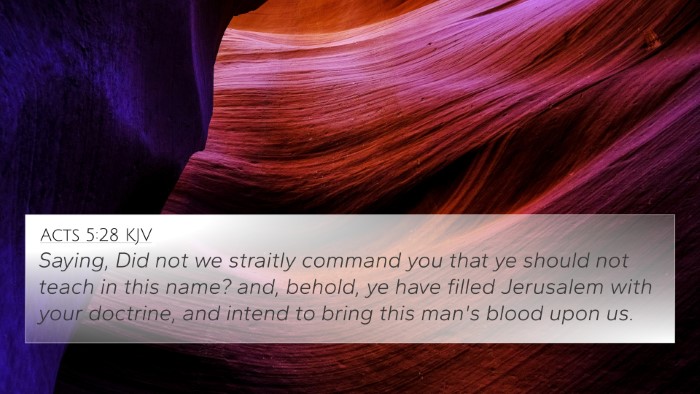
Acts 5:28 (KJV) »
Saying, Did not we straitly command you that ye should not teach in this name? and, behold, ye have filled Jerusalem with your doctrine, and intend to bring this man's blood upon us.
Amos 7:13 Verse Analysis and Similar Verses
Understanding Amos 7:13
Amos 7:13 states: “But say thou, ‘Thus saith the Lord; Thy wife shall be an harlot in the city, and thy sons and thy daughters shall fall by the sword, and thy land shall be divided by line; and thou shalt die in a polluted land: and Israel shall surely go into captivity forth of his land.’” This verse is a part of a prophetic message where Amos addresses the consequences of Israel's sin.
Summary of Key Themes
The verse brings to the forefront themes of divine judgment and the dire consequences of persistent sin. The prophet Amos communicates a severe warning directed at the people of Israel, representing God's disapproval of their actions.
Insights from Public Domain Commentaries
- Matthew Henry: Henry emphasizes that this prophetic utterance from Amos was not just a declaration of punishment but serves as a stark reminder of Israel's imminent undoing due to their infidelity to God. He notes that the mention of the wife becoming a harlot symbolizes the moral decay resulting from their idolatrous ways.
- Albert Barnes: According to Barnes, this verse captures the breakdown of family and societal structure as a direct result of divine judgment. He points out how the children would face the consequences of the parents' sin, illustrating the pervasive effects of sin on all aspects of life.
- Adam Clarke: Clarke interprets the reference to captivity as a warning of exile, reflecting God's displeasure and the consequences of turning away from His laws. He also highlights the implication of a “polluted land,” suggesting a state devoid of spiritual purity.
Bible Verse Cross-References
Amos 7:13 resonates with several other scriptures that further illustrate themes of judgment, sin, and exile. Here are notable cross-references:
- Hosea 4:14 - God addresses the spiritual infidelity of Israel and the resulting consequences.
- Isaiah 3:16-26 - This passage describes the humiliation of the daughters of Zion due to their pride and disobedience.
- Ezekiel 33:6 - Warns of the repercussions of failing to heed God's warnings, echoing the sentiment of Amos's prophecy.
- Micah 1:6 - Speaks of destruction and judgment upon Israel similar to the warnings given by Amos.
- Jeremiah 13:22 - Acknowledges the consequences of Israel's idolatry and apostasy.
- Deuteronomy 28:15 - Lists curses for disobedience, showing the longstanding principle of consequences for sin.
- 2 Kings 17:20-23 - Discusses the exile of Israel and their captivity due to persistent sin, aligning closely with Amos’s warnings.
- Romans 1:18 - Paul’s discourse on God’s wrath against unrighteousness connects with the judgment theme found in Amos.
- Matthew 23:37-39 - Jesus’ lament over Jerusalem offers a poignant reflection on God’s desire for His people despite their repeated rejection.
The Importance of Biblical Cross-Referencing
Understanding the connections between Bible verses, such as Amos 7:13 and the aforementioned scriptures, enriches our comprehension of biblical themes and narratives. Cross-referencing allows for:
- Deeper Insights: Discovering parallels and contrasts enhances the thematic understanding of Scripture.
- Biblical Dialogue: Identifying dialogues between the Old and New Testaments can clarify God’s overarching narrative.
- Contextual Awareness: Understanding individual passages within the context of the whole Bible aids in grasping its unified message.
- Application: Recognizing how themes repeat throughout Scripture can guide us in applying these lessons to our lives today.
Conclusion
Amos 7:13 is a compelling reminder of the seriousness of God’s warnings against sin. Through the lens of historical and prophetic literature in the Bible, we can glean vital truths about our relationship with God, the effects of sin, and His enduring call to repentance. Engaging in cross-referencing Bible study paved the way for a more profound understanding of biblical teachings and their relevance through generations.
Through tools like concordances and reference guides, anyone can identify these connections and deepen their knowledge of Scripture. This effort leads to a more holistic grasp of God’s Word, facilitating a rich and transformative study experience.
